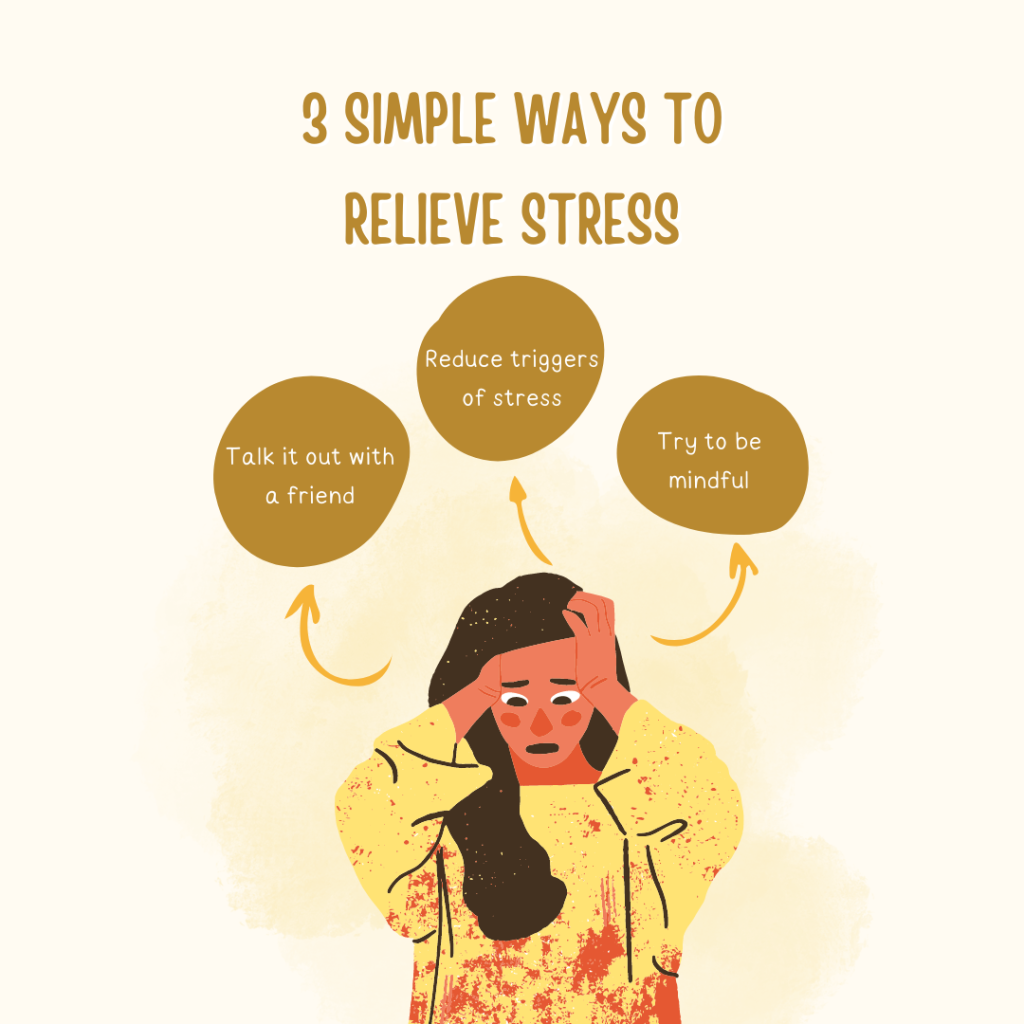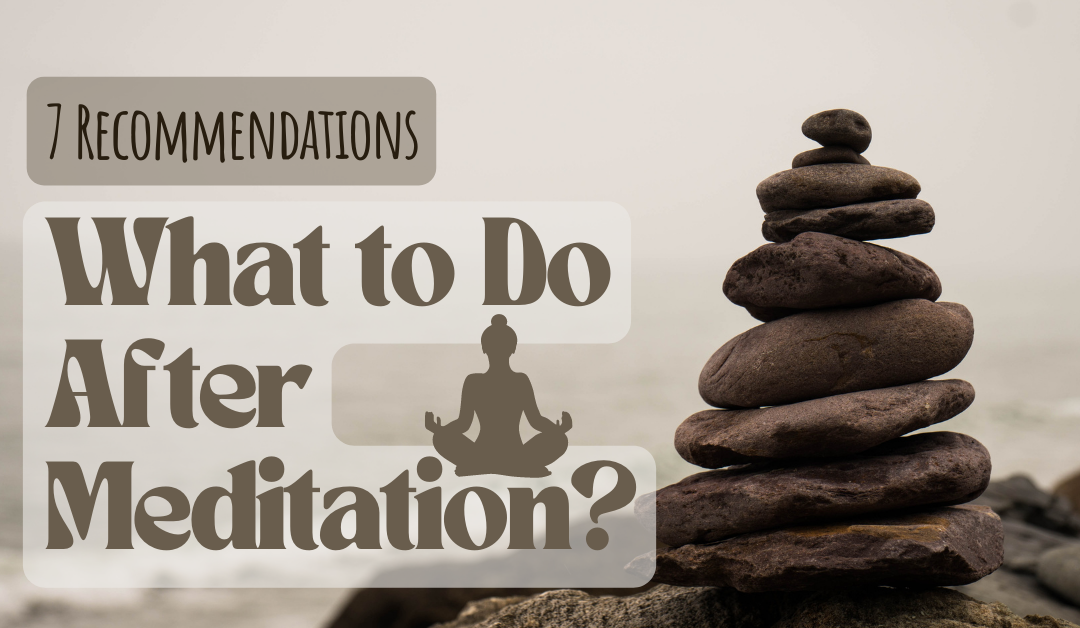Do you know what to do after meditation? Most people just get up and continue with their daily life, but meditation experts often have their own routine after their sessions.
There are no right or wrong feelings after meditation.
But a few things that have helped me after my daily meditation practice, include:
What To Do After Meditation Practices? 7 Recommendations
1. Consolidate the Entire Experience
One of the things not to do after meditation is ignore the experience. Arguably one of the worst things that you could do is just go on with your day and not think about your meditation session – especially as a beginner.
The benefits of meditation come from consolidating the process.
Take a few moments to:
- Think about what you felt
- Focus on what you feel after meditation
- Mentally review the session
Once you consolidate the experience, it’s time to move on to the next step.
Note: Do not focus on the things that went wrong too much. Recognize them but let them go. If you dwell on the negative of the experience, you’ll quickly counteract the benefits of meditation.
2. Clean Up Your Meditation Space
Often, I’ll mix cleaning up my meditation space with point one, where I consolidate everything I feel.
Why?
Cleaning is meditative in itself. You don’t want to jump right into an intense task where you have to focus on school or work.
What most people don’t realize is that cleaning has a positive impact on your mental health.
Cleveland Clinic had a fantastic podcast on cleaning and mental health, which you can learn more about here. What the clinical psychologist on the podcast revealed was that:
- Cleaning improves mental health
- Lack of cleaning can adversely affect negative health
For me, it makes sense to improve the effects of meditation by cleaning up my meditation space. It takes five minutes to clean up the space, it helps you feel better about the experience and also allows you time to compartmentalize everything that you experienced.
If there’s one thing not to do after meditation, it is leave your space cluttered.
3. Journal the Entire Experience
Journaling isn’t a must-do activity, but it’s something a lot of people recommend and it seems to work. You can use your journaling to jot down answers to the following questions:
- What went right when meditating?
- How do you feel after meditation?
- Did you gain insight when meditating?
- What didn’t go as expected?
From personal experience, I know that when meditating doesn’t go as expected, it’s always because I’m worried about something or pushing something off until later. For example, I may be in the middle of meditating and then think about how I have to go get my passport renewed, need to write a blog post or call my brother, whom I haven’t talked to in a long time.
Everyone has tasks they’re putting off until later.
However, when these tasks pop up in your mind in the middle of your meditation, it should be an indicator that you must get things done. Journaling has helped me understand my meditation practice more and actually sheds insight into things I need to get done.
If your mind is wandering to things you’ve been pushing off when meditating, it’s time to get these tasks done.

4. Stretch or Destress
If you hate stretching, you can skip this tip. Stretching isn’t for everyone, but you can always try something else, such as:
- Heat therapy
- Massage
- Etc.
Why?
Most meditation styles will help you feel relaxed. It’s not often that we’re able to relax and really relish in it. You can add to this relaxation by stretching, using a massage chair or gun or something similar.
All of these activities will help you reduce any stress or tension that you’re holding on to.
Plus, it’s always good to engage in these activities because everyone feels better when they’re not stressed out.
5. Do Something You Love
Want to know what to do after meditation to ensure that you practice again?
Do something you love.
Connecting habits together is a “hack” that will work very well if you’re trying to create new habits. How should you feel after meditation? Energized and motivated.
So, after your session, try to do something you like or want to improve on:
- Hobbies
- Language
- Exercise
- Etc.
Creating a habit will also make you feel like meditation is a reward. For example, you’ll look forward to meditating every day if you know that you get to practice piano for 30 minutes afterward.
6. Don’t End the Meditation
One thing I learned when trolling the Buddhism section of Reddit is that meditation doesn’t end. When you get up from sitting, gazing or however you’re meditating, you should still meditate on the world around you.
For example, you may want to:
- Practice mindfulness
- Walk in nature and be mindful of everything around you
- Try to feel more at one with nature
Of course, you can’t sit there for hours on end, meditating when you have things to do throughout the day. However, you can and should try to focus on the world around you a little more.
One thing I truly enjoy is being mindful of the food that I consume.
Every bite is filled with flavor and appreciation. You can think of the nutrients and energy that went into growing the food. Or you can think of the entire growth cycle of the food from the sun beating down on the ground to the rain watering and oxygenating the earth to grow the food.
7. Take a Shower
If you meditate in the morning, you may find it difficult to transition from meditating into your daily routine. For anyone feeling this way, one great recommendation I received was to shower after meditating.
Why?
- Showering is relaxing
- Showering is the transition into the day
And showering did seem to help me get on with the day and feel a lot better doing it.
After Meditation FAQs
What to Do If You Feel Light Header After Meditation?
If you feel light headed after meditation, you may want to come out of meditation a little slower. For example, you may want to lay or sit for a few minutes and practice mindfulness just to allow yourself to recenter.
Feelings after meditation vary for everyone, and many people have the light headed feeling you’re experiencing.
It’s just a part of meditation and something that you’ll get accustomed to over time. However, if you feel extremely dizzy and lightheaded in the middle of your session, simply open your eyes and breathe. Allow yourself time to feel better and increase the transition from meditation to the “waking world.”
Tip: Try a different type of meditation, such as candle meditation or mantra meditation, if you can’t shake the lightheadedness when meditating with your eyes closed.
What to Do If You’re Crying While Meditating?
Crying while meditating is a lot more common than you think. Once, Rene and I went to a deep breathing class with a good friend, which was very similar to meditating. We were all lying on the floor, practicing these intense deep breathing exercises, and then it happened.
Our friend started balling. She was crying hysterically.
While discussing it among ourselves, there were a lot of people there that mentioned crying during and after meditation.
Why?
The general consensus was that meditation allows:
- You to let go of your emotions
- You to come to peace with personal pain and experience
Don’t allow crying to cause you to be unable to meditate. Over time, you’ll come to terms with the pain and experiences that you’re feeling and the crying will stop. Allow crying to be a form of healing – it is.
Why Do You Have Headaches After Meditation?
Headaches after meditation are another experience that is quite common among meditators. Unfortunately, I couldn’t find why headaches happen. Some practitioners state that your brain function increases, causing headaches.
But, that’s not something I could verify.
Interestingly, a major analysis on meditation for headaches found that after 20 days of meditation, people were able to reduce their migraine headache pain and negative mood.
Our recommendation: Come out of meditation slower, as advised in the light headed section above and keep at it. Many people that have headaches during meditation find it subsides and goes away over time.
These are just a handful of tips on what to do after meditation. If you take the time to enjoy the experience and stop worrying about feelings after meditation, you’ll find each session gets better. Your mind will begin to focus, you’ll be less concerned about dizziness, lightheadedness and headaches.
Enjoy the experience.

